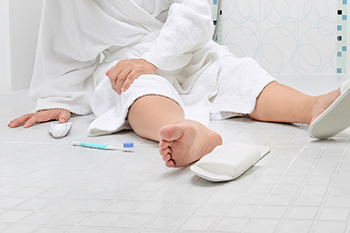
Falls prevention is particularly important for the elderly population, who are more apt to suffer from fall-related injuries. Performing regular stretching and strengthening exercises are methods that can help to maintain balance. Ensuring loose carpets are adhered to the floor, halls are cleared of obstacles, and floors are dry, can help to avoiding falling at home. It is beneficial for medications to be checked for side effects that may cause dizziness or fatigue. Having eyesight regularly checked and updating prescription eyeglasses will keep vision issues under control. Routinely going to the doctor for examinations can help with staying ahead of current or emerging health conditions, which may possibly lead to falling. For example, if blood pressure is low or arthritic joints are inflamed, falls are more likely to occur. If you have had previous falls, and sustained an injury to your feet or ankles, it is suggested that you visit a podiatrist who can help you in all of these areas, and guide you toward effective fall prevention techniques.
Preventing falls among the elderly is very important. If you are older and have fallen or fear that you are prone to falling, consult with Dr. Richard DiMario from Maine. Our doctor will assess your condition and provide you with quality advice and care.
Every 11 seconds, an elderly American is being treated in an emergency room for a fall related injury. Falls are the leading cause of head and hip injuries for those 65 and older. Due to decreases in strength, balance, senses, and lack of awareness, elderly persons are very susceptible to falling. Thankfully, there are a number of things older persons can do to prevent falls.
How to Prevent Falls
Some effective methods that older persons can do to prevent falls include:
Falling can be a traumatic and embarrassing experience for elderly persons; this can make them less willing to leave the house, and less willing to talk to someone about their fears of falling. Doing such things, however, will increase the likelihood of tripping or losing one’s balance. Knowing the causes of falling and how to prevent them is the best way to mitigate the risk of serious injury.
If you have any questions, please feel free to contact our office located in York, ME . We offer the newest diagnostic and treatment technologies for all your foot care needs.